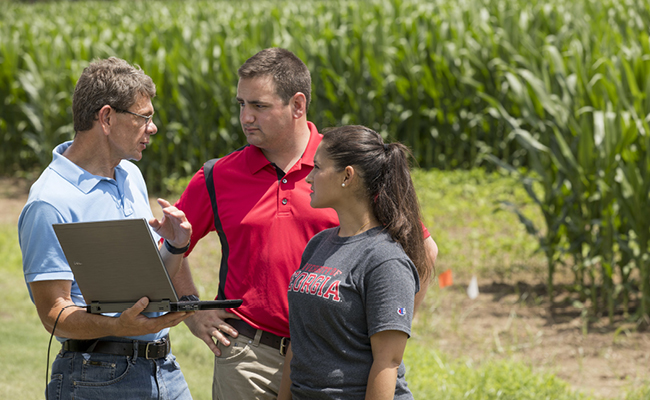 Unit will catalyze interdisciplinary research and connect researchers and students with industry partners
Unit will catalyze interdisciplinary research and connect researchers and students with industry partners
The University of Georgia is leveraging faculty expertise and strengthening industry ties through a new Institute for Integrative Precision Agriculture whose research and outreach will help sustainably feed a growing global population.
The creation of the institute complements investments from the university and the state of Georgia in new faculty, seed grant funding and equipment.
“The Institute for Integrative Precision Agriculture will be a key component of UGA’s future efforts to advance agriculture and economic development in the state of Georgia,” said President Jere W. Morehead. “I am excited about the synergies it will create in growing research and innovation, cultivating industry partnerships and expanding learning opportunities for our students.”
Precision agriculture maximizes yields through data-driven decision making enabled by technologies and tools such as such soil moisture sensors, drones, satellite imagery and robotics. Integrative precision agriculture expands the range of opportunities for optimization using artificial intelligence, machine learning and “big data” analysis. It also expands the scope of agricultural sectors involved by incorporating insights from fields as diverse as engineering, plant genomics and forestry.
“With integrative precision agriculture, we are taking the next step and enhancing the entire agricultural process,” said Jaime Camelio, professor and associate dean for research, innovation and entrepreneurship in the College of Engineering and interim co-director of the institute.
He noted that rather than focusing exclusively on row crops, Institute for Integrative Precision Agriculture faculty will address a range of commercially important sectors that include poultry, peanuts, cotton, fruits, vegetables and controlled environment agriculture. Integrative precision agriculture researchers will be housed in departments within the College of Agricultural and Environmental Sciences as well as in units such as the College of Engineering, the Warnell School of Forestry and Natural Resources, and the Franklin College of Arts and Sciences.
Building on strengths
Interim institute co-director Allen J. Moore, Distinguished Research Professor and associate dean for research in the College of Agricultural and Environmental Sciences, noted that the institute builds on several of UGA’s strengths.
The university has internationally recognized programs in poultry science, entomology, and plant genetics and genomics. Its agricultural engineering program is one of the oldest in the nation and the only one in Georgia. UGA is ranked among the top 20 universities in the world for precision agriculture, according to the trade publication Precision Ag.
“The Institute for Integrative Precision Agriculture will bring faculty and students from across our campuses together, and it will create a conduit for industry engagement,” Moore said. “The word ‘integrative’ is key. While precision agriculture is not new, our ability to use data from multiple sources in making decisions brings the potential to make greater use of the resources we have for agricultural production and processing.
“We recognize that farms, pastures, chicken houses and processing plants are not uniform,” he added, “and that optimizing the potential across this variability takes integrating information from multiple sources such as weather, soil, drainage, other organisms, diseases and any other information we can gather and integrate.”
The institute will connect research with industry partners and will host workshops with participation from industry, government agencies, students and faculty—both from UGA and other institutions. Moore noted that while no degree programs are currently in development through the institute, faculty are exploring new course offerings that reflect the interdisciplinary nature of integrative precision agriculture.
Industry trends will inform the course offerings, and industry partners will be involved in joint research projects with faculty and students. The institute will offer training and development for producers through the university’s statewide Extension and Public Service and Outreach networks as well as UGA’s growing Innovation District.
Investments to feed the future
The potential of integrative precision agriculture to revolutionize food and fiber production in Georgia and beyond is reflected in the scale of recent investments by the university and the state.
UGA has launched cluster hiring initiatives that will complement existing faculty searches to bring a total of nine new faculty members with expertise in integrative precision agriculture to campus.
The state of Georgia recently supported integrative precision agriculture at UGA through a total of $4.4 million in funding. The funding will enable the university to recruit a GRA Eminent Scholar with nationally renowned expertise in integrative precision agriculture and provide seed grant funding to jump-start faculty research.
“With the establishment of the Institute for Integrative Precision Agriculture and generous support from the state, UGA is poised to further strengthen the state’s largest industry while promoting agricultural resilience and food security,” said S. Jack Hu, the university’s senior vice president for academic affairs and provost.
What is integrative precision agriculture?
Integrative precision agriculture optimizes yields and promotes sustainability through data-driven decision making and the incorporation of insights from fields as diverse as engineering, plant genomics and forestry. At UGA, integrative precision agriculture researchers have:
- Provided farmers with yield and profit maps for cotton, allowing them to identify the most profitable areas of their fields.
- Developed automated methods of harvesting blueberries, a crop that is increasingly important to Georgia agriculture.
- Helped identify the financial benefit of applying GPS guidance to planting and inverting peanuts, as well as the feasibility of variably applying defoliants and other critical inputs on cotton.
- Developed information-centric approaches to improve greenhouse production and increase value to the grower.


